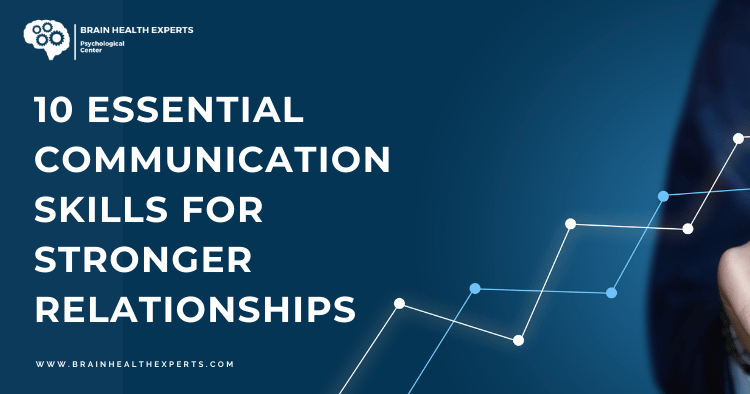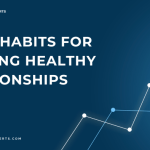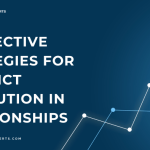Table of Contents
- Introduction
- Active Listening
- Empathy
- Clarity and Conciseness
- Nonverbal Communication
- Open-Ended Questions
- Constructive Feedback
- Emotional Regulation
- Conflict Resolution
- Regular Check-Ins
- Conclusion
Introduction
Effective communication is the bedrock of strong relationships, whether they are romantic partnerships, friendships, or familial bonds. Misunderstandings can lead to conflicts, while clear and open conversations can foster understanding and intimacy. This article explores ten essential communication skills that can significantly enhance your relationships. For further insights into how positive thinking can transform your relationships, check out 10 Ways Positive Thinking Transforms Your Relationships.
Active Listening
Active listening is more than just hearing words; it involves fully engaging with the speaker. This skill requires you to focus entirely on what the other person is saying, without thinking about your response while they talk.
“Listening is an art that requires attention over talent, spirit over ego, others over self.” – Dean Jackson
Tips for Active Listening:
- Maintain Eye Contact: This shows you’re engaged and interested.
- Nod Occasionally: This nonverbal cue indicates you are following along.
- Summarize What You’ve Heard: After they finish, paraphrase their main points to show you understand.
FAQs on Active Listening:
Q: How can I practice active listening?
A: Start by consciously reducing distractions. Put away your phone, and focus on the speaker. Practice summarizing their thoughts to reinforce your understanding.
For a deeper dive into active listening, check out MindTools and understand how it can boost your emotional well-being here.
Empathy
Empathy is the ability to understand and share the feelings of another person. It’s a crucial skill in any relationship, as it helps build emotional connections.
“Empathy is about finding echoes of another person in yourself.” – Mohsin Hamid
How to Cultivate Empathy:
- Put Yourself in Their Shoes: Try to see the situation from their perspective.
- Reflect Feelings: Acknowledge their emotions with statements like, “It sounds like you’re feeling…”
- Avoid Judgment: Approach conversations without preconceived notions.
FAQs on Empathy:
Q: How can I improve my empathy skills?
A: Engage in conversations with diverse groups of people and practice active listening. Reading fiction can also help you understand different emotional experiences.
For more insight on empathy, visit Greater Good Science Center. Additionally, fostering empathy can enhance your relationships, as discussed in our article on 10 Ways Positive Thinking Transforms Your Relationships.
Clarity and Conciseness
Being clear and concise helps avoid misunderstandings. When you articulate your thoughts well, the other person can grasp your intentions more easily.
“The single biggest problem in communication is the illusion that it has taken place.” – George Bernard Shaw
Tips for Clarity and Conciseness:
- Organize Your Thoughts: Before speaking, take a moment to outline what you want to say.
- Avoid Jargon: Use simple language that everyone can understand.
- Stay on Topic: Keep your message focused to prevent confusion.
FAQs on Clarity and Conciseness:
Q: What if my partner misunderstands me?
A: If misunderstandings occur, take a step back and clarify your message. Use examples if necessary to illustrate your point.
For more resources, check out Forbes’ guide on effective communication.
Nonverbal Communication
Nonverbal cues, such as facial expressions, gestures, and posture, can communicate more than words. Understanding these signals can improve your interactions significantly.
“Nonverbal communication is 93% of communication.” – Albert Mehrabian
Key Nonverbal Cues:
| Cue | Meaning |
|---|---|
| Crossed Arms | Defensive or closed off |
| Open Posture | Receptive and welcoming |
| Eye Contact | Confidence and interest |
| Nodding | Agreement and understanding |
FAQs on Nonverbal Communication:
Q: How can I ensure my nonverbal cues align with my words?
A: Practice self-awareness. Before speaking, take note of your body language and adjust it to match your message.
Learn more about nonverbal communication at Psychology Today.
Open-Ended Questions
Open-ended questions encourage deeper conversations. Instead of simple yes or no answers, these questions invite elaboration and reflection.
“Ask open-ended questions to encourage exploration and dialogue.” – Unknown
Examples of Open-Ended Questions:
- “What was the best part of your day?”
- “How do you feel about…?”
- “What are your thoughts on…?”
FAQs on Open-Ended Questions:
Q: How can I incorporate these into daily conversations?
A: Start by replacing yes/no questions with more open-ended ones. This will naturally lead to richer discussions.
For more on effective questioning, visit Harvard Business Review.
Constructive Feedback
Providing and receiving feedback is essential for growth in any relationship. Constructive feedback focuses on improvement rather than criticism.
“Criticism, like rain, should be gentle enough to nourish a man’s growth without destroying his roots.” – Frank A. Clark
How to Give Constructive Feedback:
- Be Specific: Highlight particular behaviors rather than generalizations.
- Use “I” Statements: This helps avoid sounding accusatory (e.g., “I felt upset when…”).
- Balance with Positivity: Start and end with positive remarks to soften the blow.
FAQs on Constructive Feedback:
Q: How do I handle feedback I receive?
A: Approach feedback with an open mind. Consider it an opportunity for growth, and ask for clarification if needed.
Explore more about feedback at MindTools.
Emotional Regulation
Managing your emotions is vital for effective communication. It enables you to respond thoughtfully rather than react impulsively.
“It’s not what happens to you, but how you react to it that matters.” – Epictetus
Tips for Emotional Regulation:
- Practice Mindfulness: Take deep breaths or meditate to center yourself.
- Identify Triggers: Understand what situations provoke strong emotional responses.
- Pause Before Responding: Give yourself a moment to process before reacting verbally.
FAQs on Emotional Regulation:
Q: What if I struggle with emotional control?
A: Seeking professional help, such as therapy, can provide strategies for better emotional regulation.
For more on emotional regulation, visit American Psychological Association.
Conflict Resolution
Disagreements are natural, but how you handle them can make or break a relationship. Effective conflict resolution ensures that both parties feel heard and valued.
“In the middle of difficulty lies opportunity.” – Albert Einstein
Steps for Conflict Resolution:
- Stay Calm: Approach the situation with a level head.
- Listen Actively: Understand the other person’s perspective before responding.
- Collaborate on Solutions: Work together to find a mutually acceptable resolution.
FAQs on Conflict Resolution:
Q: How can I prevent conflicts from escalating?
A: Address issues promptly and maintain open lines of communication to prevent resentment from building.
For further reading, check out The Conflict Resolution Network.
Regular Check-Ins
Regular check-ins help maintain the health of your relationship. They provide opportunities to discuss feelings, address concerns, and celebrate successes.
“Communication works for those who work at it.” – John Powell
How to Conduct Check-Ins:
- Set a Regular Time: Establish a consistent schedule (e.g., weekly or monthly).
- Create a Safe Space: Ensure both parties feel comfortable sharing their thoughts.
- Be Open and Honest: Share feelings and encourage your partner to do the same.
FAQs on Regular Check-Ins:
Q: What if one partner doesn’t want to participate?
A: Gently encourage them by explaining the benefits of check-ins for relationship health.
Learn more about maintaining relationship health from The Gottman Institute.
Conclusion
Building effective communication skills is a journey that pays off immensely in relationships. By practicing active listening, empathy, and other skills discussed in this article, you can cultivate deeper connections and navigate challenges more smoothly.





